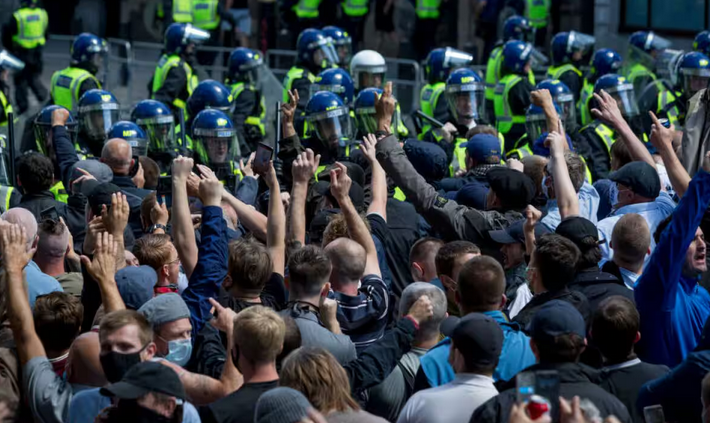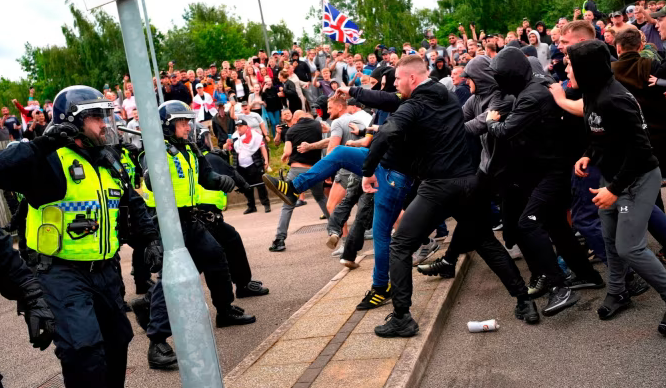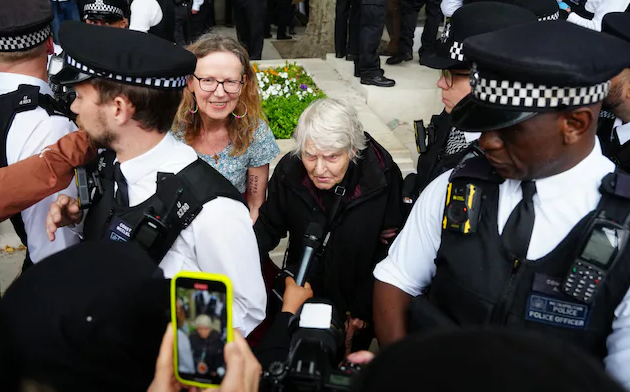The state prefers hate to hope, and given a choice, it will always side with the far-right

Tetleys TLDR: The summary
The British state always suppresses the activist left far more aggressively than the far right, through surveillance, harsh policing, draconian laws, and political purges. Undercover officers infiltrated over 1,000 leftist groups, while far-right organisers often get police protection. Protesters for climate justice and Palestinian solidarity are jailed or even labelled terrorists, while far-right agitators like Tommy Robinson face far less consistent action and their actions are treated as criminal rather than political. Since Keir Starmer’s Labour came to power in 2024, the repression has worsened. Labour retained anti-protest laws, cracked down on social media dissent, and even oversaw the arrest of pensioners and Holocaust survivors for peaceful protests. The party has also purged left-wing MPs for opposing war and austerity. The reason? The activist left threatens entrenched power. The far right, for all its bile, does not. When the state talks about 'extremism', it’s often really talking about dissent.
Tetleys TLDR: The blog
Despite government rhetoric about tackling extremism ‘wherever it appears’, a cold-eyed look at Britain's policing, legal, and surveillance apparatus reveals a stark imbalance. The empty platitudes in Westminster will occasionally berate the far-right but it is empty words. While far-right figures and groups have been occasionally targeted, it's the activist left that faces the lion's share of suppression. From pre-emptive arrests to deep surveillance and criminalisation of protest, the British state consistently directs its most draconian tools at those who threaten power from below, not from the far-right fringes of nationalism. Only when the state is forced to react against the threat of imminent extreme far-right violence does it turn it's attention on the fascists, and then they will use criminal rather than political responses.
Surveillance and Infiltration: A One-Sided Story
The most telling evidence of this imbalance is the now-infamous ‘Spy Cops’ scandal. Between the 1960s and 2010s, undercover police officers infiltrated over 1,000 groups, overwhelmingly left-wing, environmentalist, or anti-racist in nature. These included campaigns for justice for murdered Black teenager Stephen Lawrence, anti-apartheid organisations, and peace activists. Some officers formed intimate relationships with women activists under false identities. Meanwhile, there's although it did happen occasionally, there’s scant evidence of equivalent deep infiltration into far-right organisations.
Blacklisting and union busting
The state's collusion with employers to blacklist trade unionists, many of them simply fighting for basic rights and safety, is another stain on its record. The Consulting Association, exposed in 2009, maintained a secret database of thousands of workers, many of them targeted for their union activity. Documents showed close cooperation between this illegal blacklisting operation and police units.
The legal double standard
The British legal system routinely criminalises left-wing protest while giving far-right agitation far more leeway.
- Just Stop Oil and Extinction Rebellion activists have been jailed for non-violent protest, sometimes under arcane laws like those covering public nuisance or infrastructure sabotage.
- Palestine Action was designated a terrorist organisation in 2025 for vandalising weapons infrastructure. The group has never committed an act of violence against people.
In contrast:
- Tommy Robinson, a far-right agitator with a history of incitement and criminal contempt, has been arrested and/or imprisoned only sporadically, and rarely for hate speech itself. This latest time for violence.
- Far-right marches often receive extensive police protection, even when openly racist and provocative.
- Have you ever wondered why Tommys groups have never been proscribed. Exactly the same reason that the Orange Order hasn't. Because they fly the flag and are royalists and Unionists.

This is nothing new: at the Battle of Cable Street in 1936, the role of the police wasn’t to stop Oswald Mosley’s fascists, it was to protect them. The police baton-charged anti-fascist demonstrators while attempting to clear a path for the British Union of Fascists. Then, as now, the state’s priorities were clear. Ninety years later this function of the Police remains the same.
And so if Far-right extremists platform hate speech and perform fascist salutes in front of the Police, they are left unmolested. But if pensioners carry a sign protesting Gaza, they are arrested. The state is quite clear where it sits.
Prevent: weaponised against the left and Muslims
The Prevent strategy, designed to counter terrorism, has been disproportionately wielded against Muslims and left-wing campaigners. University lecturers have been told to report students for discussing anti-capitalism or Israel-Palestine. Young children have been referred to Prevent for drawing pictures or expressing support for Palestine. Meanwhile, actual neo-Nazi grooming online receives relatively less institutional focus
Media framing and political cowardice
The media echo chamber, bolstered by political elites, feeds this state bias. Activist leftists are labelled ‘eco-zealots’, ‘extremists’ or ‘terrorist sympathisers. Keir Starmer's Labour Party has purged socialists, trade unionists, and Palestinian advocates, cementing a bipartisan hostility to grassroots radicalism. The far right, on the other hand, is often treated as an unfortunate but understandable reaction to modernity.

Recent case studies
| Event | State Response | Target Ideology |
| Palestine Action vandalises Elbit factory | Proscribed under terrorism laws | Left-wing, pro-Palestine |
| Just Stop Oil blocks roads | Arrests, pre-emptive jailing | Environmentalist |
| Tommy Robinson rallies | Police protection, rare bans | Far-right |
| Trade union strikes (e.g., RMT) | Threats of anti-strike laws | Labour movement |
| National Action plot | Group banned after terrorist planning | Far-right |
Escalation under Labour
The arrival of a Labour government under Keir Starmer has not tempered state suppression, in many ways, it has worsened.
- Labour has retained and enforced draconian laws passed under the Conservatives, such as the Public Order Act 2023 and the Strikes (Minimum Service Levels) Act 2023, despite promising reform.
- A March 2025 Netpol report warned of an intensifying crackdown on protest, describing it as a form of state repression, with climate activists and Palestine solidarity campaigners facing increasingly aggressive policing.
- Labour has continued to use Prevent and other surveillance tools against social media critics, especially those opposing migration policies or showing solidarity with asylum seekers.
- Internally, Labour has suspended or expelled left-wing MPs like John McDonnell and Zarah Sultana for opposing right-wing policies, signalling that suppression isn't just external, it's also intra-party.
- Human Rights Watch and Liberty have both condemned the Labour government for failing to uphold democratic freedoms in 2025, accusing it of eroding the right to protest and dissent.
- Most shockingly, police under Labour’s leadership have arrested elderly peace activists, including pensioners and Holocaust survivors, for taking part in peaceful sit-ins or vigils outside arms manufacturers and government buildings. These symbolic arrests, some of individuals in their 80s, have drawn international condemnation and highlight just how far the state will go to crush even the most morally unimpeachable dissent.
Suppression by design
The British State, despite it's claims to neutrality, suppresses the activist left far more consistently than the far right. Why? Because the left, especially when it organises in solidarity, disrupts capital or calls out imperialism, it threatens entrenched power and calls for systemic change. The far-right, whilst occasionally violent, reaffirms the status quo: nationalism, policing, corporatism, borders and heirachy. This suppression has only intensified under Labour, whose actions now match, and in some cases exceed, those of the previous Tory regime. The group that sow division and hate do not threaten the interest of the state, rather they reinforce them. So the state is always going to be on their side.
So when you hear ministers talk of ‘extremism’ ask yourself: is it really about danger, or is it about crushing dissent?
More often than not it is the latter.
Further Reading and References
- Undercover Policing Inquiry: https://www.ucpi.org.uk
- The Blacklist Support Group: https://www.hazards.org/blacklistblog/
- Liberty: https://www.libertyhumanrights.org.uk
- Netpol (Network for Police Monitoring): https://netpol.org
- Guardian, "Undercover police officers infiltrated 1,000 political groups": https://www.theguardian.com/uk-news/2023/nov/21/police-spycops-inquiry
- BBC, "Prevent strategy 'used to spy on activists'": https://www.bbc.co.uk/news/uk-52887315
- Byline Times, "Protest Crackdown Under Labour": https://bylinetimes.com/2025/03/19/protest-crackdown-in-britain-now-amounts-to-state-repression-and-the-labour-government-is-continuing-the-trend-warn-campaigners/
- The Guardian, "UK Faces Suspension from Oil Oversight Body": https://www.theguardian.com/world/2025/jun/27/suspend-uk-from-oil-oversight-body-over-protests-crackdown-say-campaign-groups
- Human Rights Watch: https://www.hrw.org/news/2025/01/16/uk-new-government-failing-uphold-democratic-freedoms
- The Telegraph, "Labour Spy Unit Monitoring Migrant Hotel Critics": https://www.telegraph.co.uk/politics/2025/08/01/trump-team-concerned-labour-spies-migrant-hotel-critics
- Financial Times, "Tensions at Migrant Hotel Protests": https://www.ft.com/content/4dd25833-d84c-4276-958f-c2d2effdf89e
A bit of shameless self-plugging here. This is www.TetleysTLDR.com blog. It's not monetised. Please feel free to go and look at the previous blogs on the website and if you like them, please feel free to share them.

